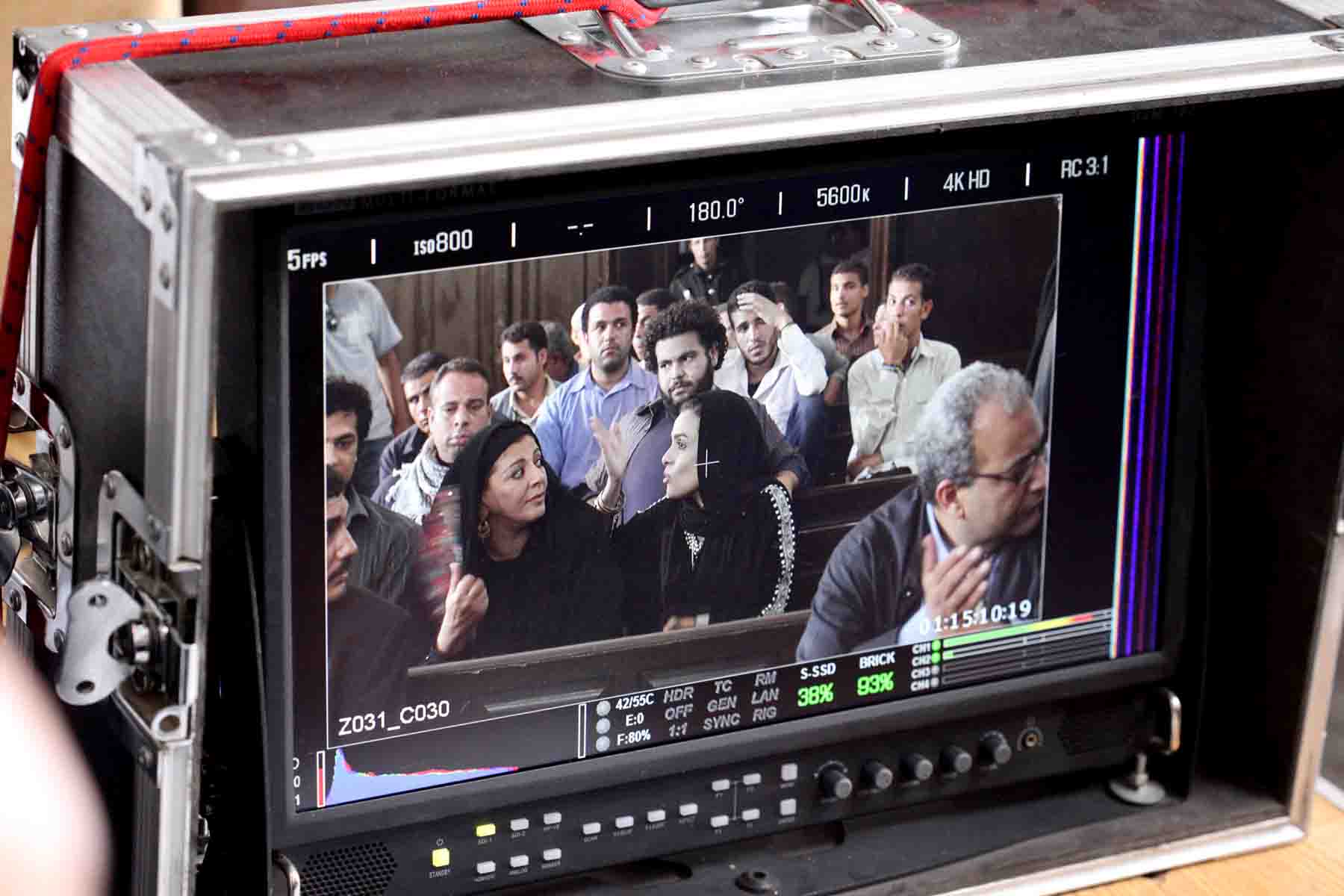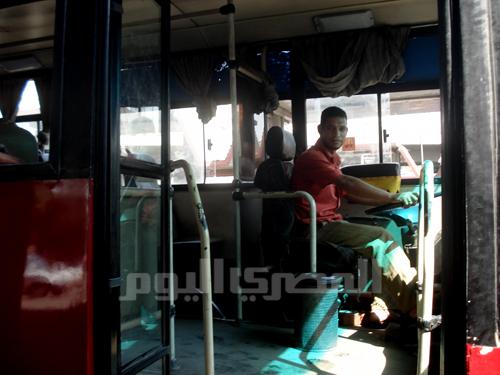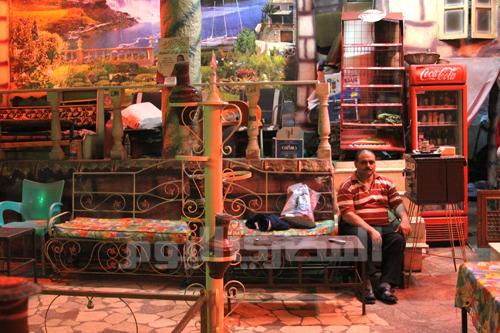
It’s the last day of shooting for “Arafa al-Bahr,” a Ramadan soap opera that began the night before Ramadan and will continue until the last day. Like the 72 other shows this year, the plot and storyline have to stretch over the next 30 days, entertaining viewers nightly and pulling in the show’s cost in advertising for the channel.
The show is a social drama about the lives of the fishermen in Ezbet el-Sayadin in Alexandria. The story revolves around fisherman Arafa Gindeya, his family and his rivalry with his cousin, Kharashi Gindeya.
For actress Yara Goubran, who plays Samira in the show, today marks the end of about six months of intermittent shooting, preparing, hair blow-drying, costume donning and just plain late nights and hours spent in the actors’ “caravans” — camper vans that park near filming sights to provide changing rooms, bathrooms, a place to sit down and, in this heat, a chance for a little AC.
On this day, Goubran is expected on site at the relatively relaxed time of noon, although that isn’t always the case.
“Sometimes we start at 5 am to avoid the heat, get the right light or make it through the shoot before the end of the day,” says Goubran. There are nights when she remains on-site until 3 or 4 am.
I meet Goubran at the gates of Egypt Media Production City in 6th of October, and we drive to “Garden City” — a set of buildings meant to replicate the architecture and monuments of the classy Cairo suburb. It’s the day of shooting the scenes that take place in the courthouse.
“We shoot according to location,” says Goubran, “so often we shoot scenes that are not necessarily in sequential order because, for example, there will be a scene at the beginning of the TV show in a courthouse and then another couple of scenes in a courthouse at the end. It’s likely we shoot those scenes in the same day.”
This is why Goubran, like many actors and actresses, has an assistant.
“Yasmine helps me by taking care of my bags, helping me stay on schedule and keeping pace with my raccord, keeping me ‘mitraqwara.’”
Raccord, a French word meaning connection, has been absorbed into Arabic cinema lingo to mean properly continuing from shoot to shoot in a scene or for a day in the story.
Raccord is a complicated process, the responsibility of which falls on the assistant director in charge of costumes — for “Arafa al-Bahr,” that’s Noha Fadl. Fadl alerts Goubran of the things she needs to bring with her to a shoot to keep up the continuity but when scenes from different days are happening back to back, an assistant will follow up and make sure hair, makeup, clothes and accessories are ready for the next scene. Other things to remember can be hair styles, wedding rings, makeup, etc.
Extras lounge on the grass in front of the buildings, waiting for the scene to be set and their presence to be requested. When you arrive at a location, hair and makeup come first. The “Garden City” house we are in provides rooms for changing, makeup and hair.
Goubran sets up in front of a mirror, and the show’s makeup artist, Magdy Imam, begins by coating her face in a foundation that helps the makeup set in the heat and under hot lights while shooting. Maged, the hair dresser’s assistant, is next, blow-drying her hair straight and then Hassan Gad curls and sets it, spraying a little hairspray to keep it from getting messed up.
The heat penetrates the makeup room despite a good breeze through the balcony, and all the other actresses have migrated to the caravans. Goubran and I join suit with Yasmine in tow, ready to pull out the abaya, a body covering, that Goubran needs to wear for the first scenes being shot in the courthouse.
Once dressed, we join two other actresses, Nermine Maher (Souna) and Noha Lotfy (Wanana), for a chat about acting, scenes in the movie and people in the industry. Stylist Shaymaa Eissa and producer Lillian Salem stop in — the conversation is animated.
Two days before, most of the group members were at a shoot in the middle of the desert, at Kimoland, where they spent hours standing around and eventually were asked to take their places next to a burning tire. Goubran, suffering from food poisoning, felt unwell and had to go home. From the moment we arrived at Media City, conversations with actresses, stylists and crew begin with concern about her well-being.
Food arrives intermittently, sent in by the cafeteria team with sodas, water and juice available whenever. The time passes because the company is good. Normally the actresses would be reading through lines before a scene, but the scenes in the courthouse have no lines for the three in the caravan. By the time Fadl calls the women into the courthouse, it’s 5:30 pm.
The courthouse is dusty, packed and chaotic. The cameramen and the director exchange information over the din of the extras, left in their seats in the heat. Lights are set up outside the windows to create daylight as the sun outside sets. I take my place behind director Ahmed Medhat and the monitor, and as the dust and the people settle, the first call for silence, closed doors and attention rises above all.
Like a movie, the monitor frames the shot of the benches. The three women, Lotfy, Maher and Goubran, sit in a row, ready to act out their reactions to the decision of the judges. The shot of the judges speaking their lines has already taken place and, for editing reference, the lines are repeated while director of photography Haitham Hosny gets the shot of the reactions of the actors. Nour Sherif, playing Arafa — the show’s star — comes to take his spot in the cage. Take one, and the scene shoots once, twice. Then we’re done for now.
Back in the caravan, Goubran changes into a different abaya for a courtroom scene planned for a different day in the sequence of the show’s story. Then it’s time to rest a little before the next scene, which is promised to be the last for the entire show.
“You’ll shoot once in the courthouse and once on the steps and we’re done,” says Fadl.
We’re not there for long. The cramped area makes one restless, and as the weather cools outside, the main actors gather at the terrace on the steps of the courthouse to wait for their next scene. Usually actors gather to run lines together before they shoot, but today there are few to no lines for those gathered.
Sherif reads through his lines in a blue chair outside the courtroom before the next scene. Sherif, an incredibly talented actor whose career spans decades of classic Egyptian movies, most recently is followed closely for his Ramadan soaps.
Ahmed Bedeir, who plays the villain Kharashy, is a comedic actor from Sherif’s generation and is known for his wit and humor, and his roles in classic plays and movies. Although his role in “Arafa al-Bahr” is serious, all gather for his humor between scenes as he asks the assistant director jokingly why she needs him to stick around.
The show’s third heavyweight actor is Hala Sidky, who plays Zaafaran. Sidky is also a comedian from the same generation, and has been in films and soaps since the 1980s. This evening, Sidky finishes filming a scene and drifts by to join in on the casual gathering on the terrace with Bedeir, Goubran, actress Mai Nour (To’a) and actor Ahmed Daoud (Ibrahim).
The next scene shoots at 7 pm. Goubran, Maher and Sidky gather in the fourth row as a witness reveals exciting new information to the courthouse. Sherif and the women exchange surprised glances. The scene requires a connected glance between Sherif and Sidky without being able to watch the camera pan; it takes a take or two to get it timed right.
Setup begins on the stairs of the courthouse for the last scene to be shot in the whole series. It’s been an intense ride for Goubran, who has been working simultaneously on “Arafa El Bahr” and actress Yousra’s “Sharbat Loz,” which finished shooting a couple days earlier.
Eissa, the stylists, explains that it is not always the case for shows to finish shooting before the beginning of Ramadan.
“I’m working on a show that still has a few days left,” she explains. “It’s common, but it becomes an issue when problems occur, and the show is still shooting its last episodes in the last weeks of Ramadan. Shows have been canceled early for this reason.”
But for Goubran, the filming of “Arafa Bahr” ends tonight. Work for Ramadan 2012 has come to an end, and she welcomes a little break.
Egypt is a massive living organism — a web of ticking clocks, each set to a slightly different millisecond. Doctors, valets, belly dancers and beggars. … Cairo keeps 18 million cogs in one of the world’s busiest wheels. The “Cogs in the wheel” series takes a magnifying glass to one person, a representative of a job that keeps the city ticking. For more stories in the series, visit www.egyptindependent.com/
This piece was originally published in Egypt Independent’s weekly print edition.



